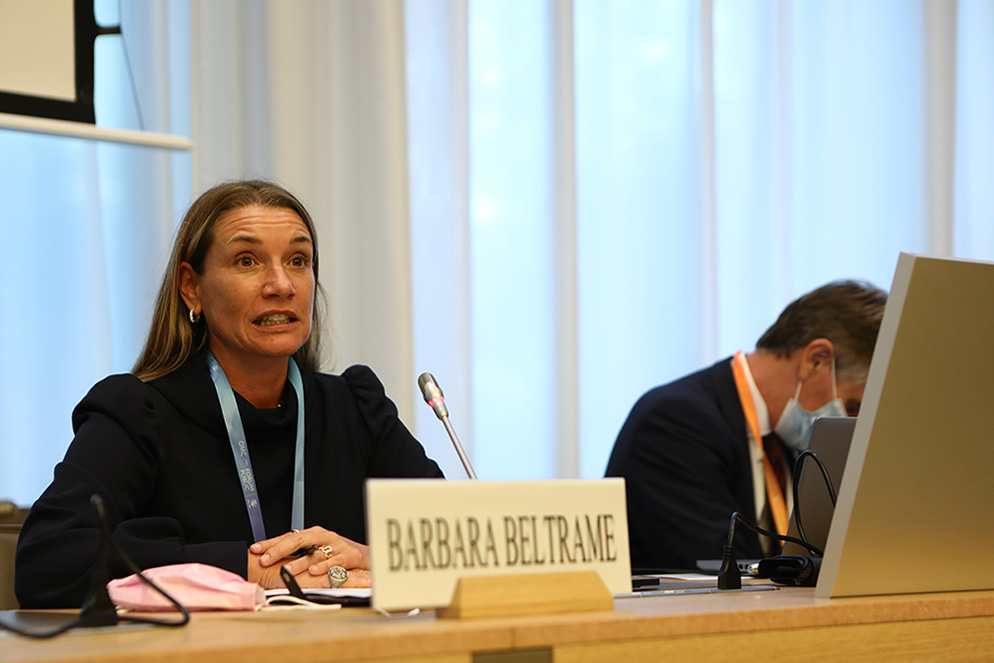BUSINESS, TRADE AND THE WTO
More
Allowing WTO members to benefit from a fully functioning dispute settlement mechanism was one of the business community's first priorities. In addition, both the ICC and the B20 highlighted the importance of a strong notification and trade monitoring system, which would allow the WTO to play a central role during the current pandemic and future crises.
At the session entitled “The future WTO work program: Insights from business”, the two organizations urged the WTO to play a key role in ensuring access to effective supply chains and called for the conclusion of negotiations on curbing harmful fisheries subsidies by MC12.
In her opening remarks, DG Okonjo-Iweala said: “Business has a stake in the WTO. The system continues to provide stability and predictability to your operations. It keeps tariff and non-tariff barriers in check and offers avenues to address discrimination against your exports.”
She added: “My message to you is straightforward: we need concrete results at MC12. That is necessary to show that the WTO is back on track, and that it can deliver for members and people relying on trade to drive a strong economic recovery. The support of the business community — and your active engagement with your governments, and in the media — will be crucial to make results at MC12 possible.”
“I encourage you and your constituencies to talk to your governments, support them to be ready to negotiate — and even more importantly, ready to compromise — in favour of a revitalized, reinvigorated WTO.”
John Denton, Secretary-General of the ICC, noted that equitable access to vaccines is critical for business and for economic growth. He warned that the risks of interruptions to global supply chains and global growth will continue until the whole world is vaccinated. He emphasised that the WTO has a vital role to play in helping to achieve this objective.
Mr Denton announced that the ICC has launched today a paper entitled “Global Business Priorities for the WTO”. The paper covers five priority areas the business community would like WTO members to address at MC12 and build into a work programme over the next few years. These include WTO reform, trade and health, trade and environmental sustainability, trade and the digital economy, and trade and inclusivity.
B20 Italy Chair Emma Marcegaglia noted that the WTO should play a role in discussions on sustainability and climate change by accelerating the deployment of technologies and services that are a necessity for tackling these challenges.
She said: “Without a strong WTO, we will not achieve what we want — that is, longer-term growth that is more sustainable and more inclusive for the next decade.”
Ms Shinta Kamdani, CEO, Sintesa Group, Co-Chair of the B20 Task Force on Trade and Investment, said that the WTO and the multilateral trading system should empower small businesses and help them integrate into global supply and value chains. For micro, small and medium-sized enterprises (MSMEs) to benefit from opportunities presented by the global economy, the WTO should be reducing non-tariff measures, fostering homogenous standards, facilitating trade via digital means, and facilitating financing for MSMEs to help them trade globally, she noted.
She also underlined the unique challenges facing business in developing countries, such as lack of digital infrastructure, that is preventing them from tapping into digital trade. She also noted that business in developing countries may face difficulties in adapting to environmental sustainability measures.
In summing up, DG Okonjo-Iweala said: “I really look forward to working with the business community on all these issues. You are going to have to be part and parcel of these reforms. I hope we can work hand in hand.”
Share
Share
Problems viewing this page? If so, please contact [email protected] giving details of the operating system and web browser you are using.
